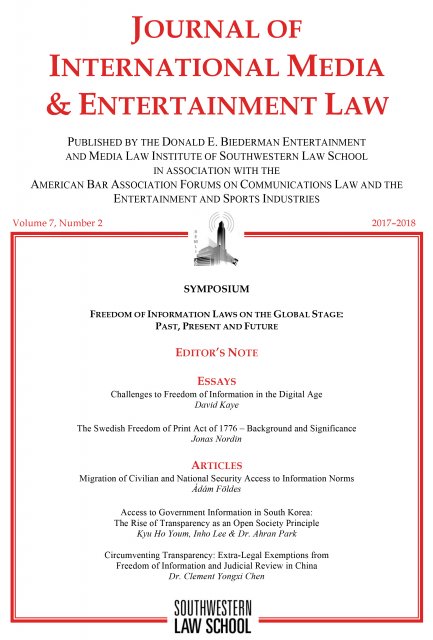SWLAW Blog | Faculty Features

April 1, 2018
New Issue of JIMEL Volume 7, No. 2 Is Out
The latest issue of Southwestern's Journal of International Media and Entertainment Law is now posted on our website on the JIMEL page. Volume 7, No. 2 is dedicated entirely to the 2016-2017 symposium, Freedom of Information Laws on the Global Stage: Past Present and Future.
Professor Michael Epstein, Supervising Editor of the Journal of International Media and Entertainment Law, describes the issue this way:
“This is the second of two issues dedicated to the 250th anniversary of Sweden’s Freedom of Information Law, the world’s first, and the 50th anniversary of America’s landmark Freedom of Information Act. In keeping with the Journal’s global mandate, this issue examines access to government information in South Korea, China, and Europe. Access to government information is a compelling issue of our time. Volume 7 of the Journal offers a comprehensive, comparative view of the current state of FOIA laws on the global stage.
The first article, Migration of Civilian and National Security Access to Information Norms, by Ádám Földes, applies Sujit Choudry’s metaphor of migration of norms to the intersection of civilian and national security fields on national and international levels. A legal advisor at the International Secretariat of Transparency International in Germany, Földes shows how access to information norms evolve through national legislation, international treaties, and the decisions of national and regional courts.
Access to Government Information in South Korea: The Rise of Transparency as an Open Society Principle examines the conceptual and theoretical framework of the right to information in South Korea. Revised and expanded from an original presentation by Professor Kyu Ho Youm, the Jonathan Marshall First Amendment Chair at the University of Oregon, with additional contributions from Korea-based media law scholars Inho Lee and Ahran Park, the article engages the manner in which access to information is guaranteed as a constitutional and statutory right in Korea.
From China comes Circumventing Transparency: Extra-Legal Exemptions from Freedom of Information and Judicial Review in China, by Clement Yongxi Chen. Chen, a post-doctoral fellow at the University of Hong Kong, explores the complicated relationship between China’s 2007 Regulation on Open Government Information, which established a right of access, and preexisting state authorities that have power to control information. For Chen, transparency reform ultimately depends on the role of the Chinese courts in settling conflicts involving the flow of information in China.
Included in this issue are two outstanding essays that serve as an introduction to the articles—and to the symposium. The first is Challenges to Freedom of Information in the Digital Age, by David Kaye, the U.N. Special Rapporteur on the Promotion and Practice of the Right to Freedom of Opinion and Expression. Kaye, a professor at the University of California, Irvine, School of Law, delivered a compelling keynote address about the often-fraught state of information access around the world, upon which this essay is based.
In the second essay, The Swedish Freedom of Print Act of 1776 - Background and Significance, Dr. Jonas Nordin, the Secretary of the Research Council at The National Library of Sweden, provides his scholarly observations upon the 200th anniversary of Sweden’s Freedom of Information Law, the world’s first.
The Journal of International Media & Entertainment Law is looking forward to publishing papers from January’s symposium, Fake News and 'Weaponized Defamation': Global Perspectives, in our next volume."